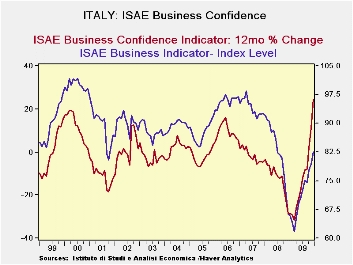 Global| Dec 29 2009
Global| Dec 29 2009Italian Business Confidence Advances...But Still Lags
Summary
Italian business confidence is shooting up strongly but still clings to relatively weak absolute readings. The level of the current reading stands in the 52nd percentile of the range of values occupied since October of 1996. But by [...]

Italian business confidence is shooting up strongly but still clings to relatively weak absolute readings. The level of the current reading stands in the 52nd percentile of the range of values occupied since October of 1996. But by rank the current index stands 136th out of 159 readings or in the bottom 12 percentile of all readings over that same span. That is not a very reassuring statistic despite the rise in the index this month. This percentile rank-in-queue measure is uniformly weak across the various components this month. Unfortunately inventories have the highest reading within each commodity category. Of all commodity types consumer goods are doing the best while investment goods and intermediates goods are lagging nearly equally.
The graphic below shows the strength of the current surge depicting both the absolute level of the index and its percentage rise on the same graph. We can hope that the rise continues and that it will bolster the level reading further. But for the rest of the e-Zone a good deal of pessimism remains.
France’s final GDP figure confirms the weak rise in GDP in Q3 although it does show two quarterly gains in a row. In the UK private forecasters have reaffirmed their view of slow growth in the UK for the year to come. Italy’s business survey results seem to fit snugly into this grouping of reports that shows some improvement but still no gusto.
| Since Oct 1996 | |||||||
| Dec-09 | Nov-09 | Oct-09 | Sep-09 | Percentile | Rank | Rank% | |
| Biz Confidence | 82.6 | 79.4 | 77.8 | 74.6 | 52.0 | 139 | 12.7% |
| TOTAL INDUSTRY | |||||||
| Order books & Demand | |||||||
| Total | -40 | -47 | -50 | -52 | 33.8 | 146 | 8.2% |
| Domestic | -41 | -47 | -49 | -49 | 35.8 | 146 | 8.2% |
| Foreign | -41 | -49 | -54 | -55 | 35.8 | 146 | 8.2% |
| Inventories | -2 | -2 | -3 | 1 | 37.5 | 125 | 21.5% |
| Production | -38 | -45 | -49 | -47 | 28.6 | 147 | 7.6% |
| INTERMEDIATE | |||||||
| Order books & Demand | |||||||
| Total | -52 | -55 | -57 | -55 | 26.8 | 146 | 8.2% |
| Domestic | -53 | -55 | -57 | -54 | 27.4 | 146 | 8.2% |
| Foreign | -49 | -56 | -56 | -59 | 31.6 | 146 | 8.2% |
| Inventories | -4 | -6 | -7 | -1 | 37.9 | 113 | 29.1% |
| Production | -48 | -51 | -52 | -51 | 25.0 | 147 | 7.6% |
| INVESTMENT GOODS | |||||||
| Order books & Demand | |||||||
| Total | -45 | -56 | -62 | -61 | 26.7 | 146 | 8.2% |
| Domestic | -45 | -54 | -54 | -55 | 30.0 | 146 | 8.2% |
| Foreign | -48 | -54 | -66 | -61 | 25.3 | 147 | 7.6% |
| Inventories | -3 | 0 | -1 | -1 | 36.8 | 111 | 30.4% |
| Production | -45 | -52 | -61 | -58 | 21.6 | 147 | 7.6% |
| CONSUMER GOODS | |||||||
| Order books & Demand | |||||||
| Total | -23 | -32 | -36 | -38 | 44.9 | 133 | 16.5% |
| Domestic | -23 | -32 | -36 | -39 | 50.0 | 125 | 21.5% |
| Foreign | -31 | -36 | -41 | -42 | 37.1 | 141 | 11.4% |
| Inventories | -2 | 1 | -1 | 1 | 34.6 | 111 | 30.4% |
| Production | -21 | -33 | -37 | -33 | 43.9 | 137 | 13.9% |
| Total number of months: 159 | |||||||
Robert Brusca
AuthorMore in Author Profile »Robert A. Brusca is Chief Economist of Fact and Opinion Economics, a consulting firm he founded in Manhattan. He has been an economist on Wall Street for over 25 years. He has visited central banking and large institutional clients in over 30 countries in his career as an economist. Mr. Brusca was a Divisional Research Chief at the Federal Reserve Bank of NY (Chief of the International Financial markets Division), a Fed Watcher at Irving Trust and Chief Economist at Nikko Securities International. He is widely quoted and appears in various media. Mr. Brusca holds an MA and Ph.D. in economics from Michigan State University and a BA in Economics from the University of Michigan. His research pursues his strong interests in non aligned policy economics as well as international economics. FAO Economics’ research targets investors to assist them in making better investment decisions in stocks, bonds and in a variety of international assets. The company does not manage money and has no conflicts in giving economic advice.






